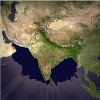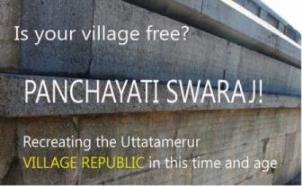
SINDULAND GENIUS
Timeless ideas from the land where the Sindu Flowed
...As applied in the present context

**It is about how the villages of India must team up and bear responsibility for their own development.
**It is about how to set up an environment where villages are encouraged to become self reliant.
**How villages can work on thier goals, economy, education, environment, traditions, health and everything else using their own mite without having to depend on anyone from outside.
It is the heart of the matter in the middle part (part 2) of the book "Rising to Second Freedom" (Ref4). It deals with the challenge of decentralization and extracts know-how, from times past, when power was effectively wielded by the local authorities. It explores how the Gandhian thought and the thoughts of the statesmen of the Chola period match.
As such this is an oprational part of the over all study reflected by this website and it is covered in the website by the same name (Panchayati Swaraj)
Please access this site and encourage village leaders to study it. See how they can activate their respective villages to reach out for freedom.
In brief the study recommends six freedoms a village has to achieve if it is to have control over its own destiny. As the village begins to question itself and set its own standards it is hoped that it will also team up into a cohesive unit. And in the process it will focus a lot of its energies in its own development and in the development of its citizens.
While at the micro level it deals with citizens attaining control over their own desinies, at the macro level it translates into tackling some of the major problems related to poverty and disparity that is challening the nation and the world.
It is about democracy of a holistic kind. Abraham Lincoln defined democracy as a rule:
BY the people
OF the people and
FOR the people.
He missed mentioning
"WITH the People"
Even during Lincoln's time such rule was in effect in small measure in the US. This is evident in the fact that the Mayor in the US is a much more powerful person than in India. This power-to-the-people at the grassroots was also practiced in a refined form under monarchy in India. But circumstances did not allow for it to be incorporated into the life blood of the new Indian democracy seven decades ago. It is time for a re-jig. Please visit the Panchayati Swaraj website pswaraj.com it can form the basis for a strong movement towards solving problems of rural India.
